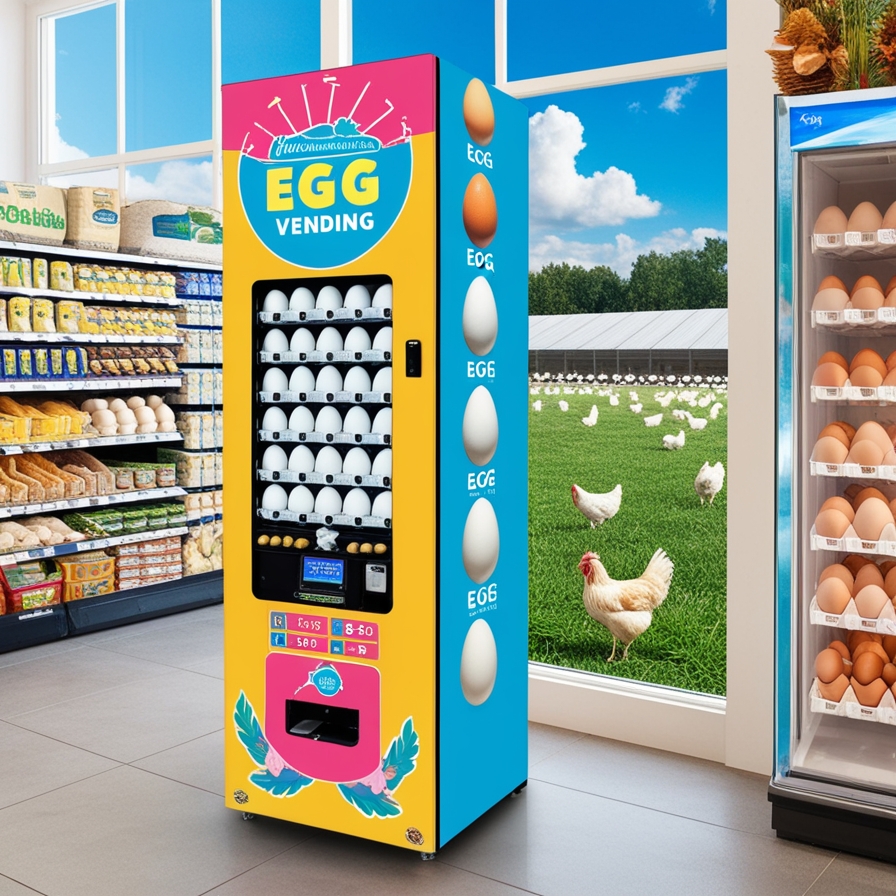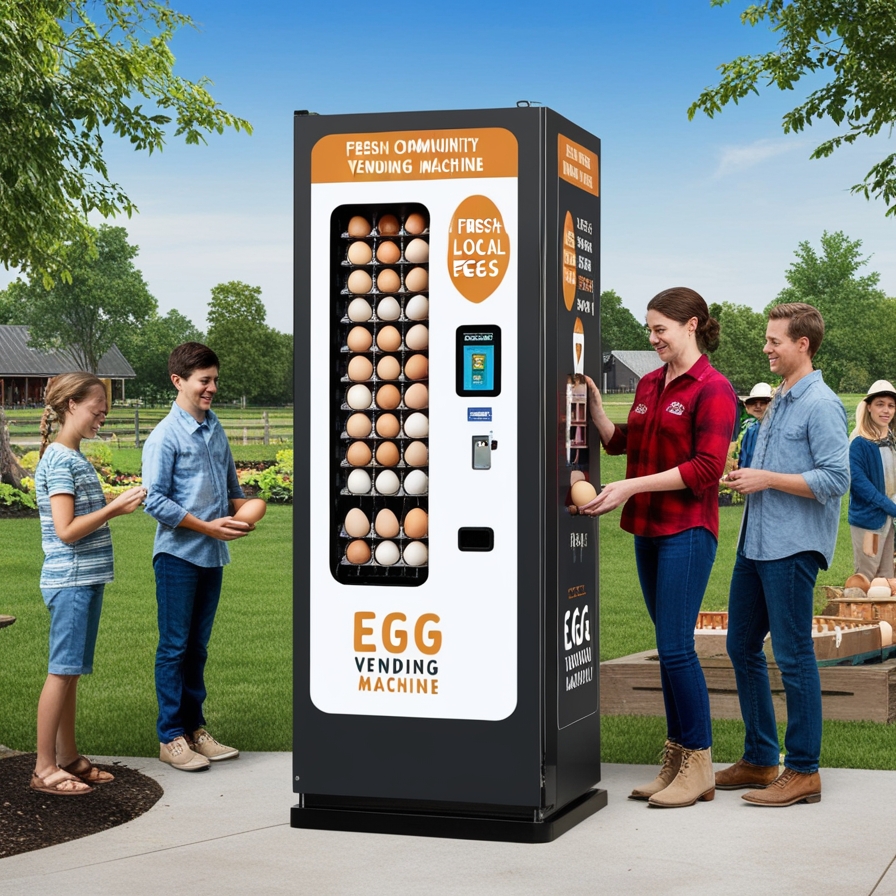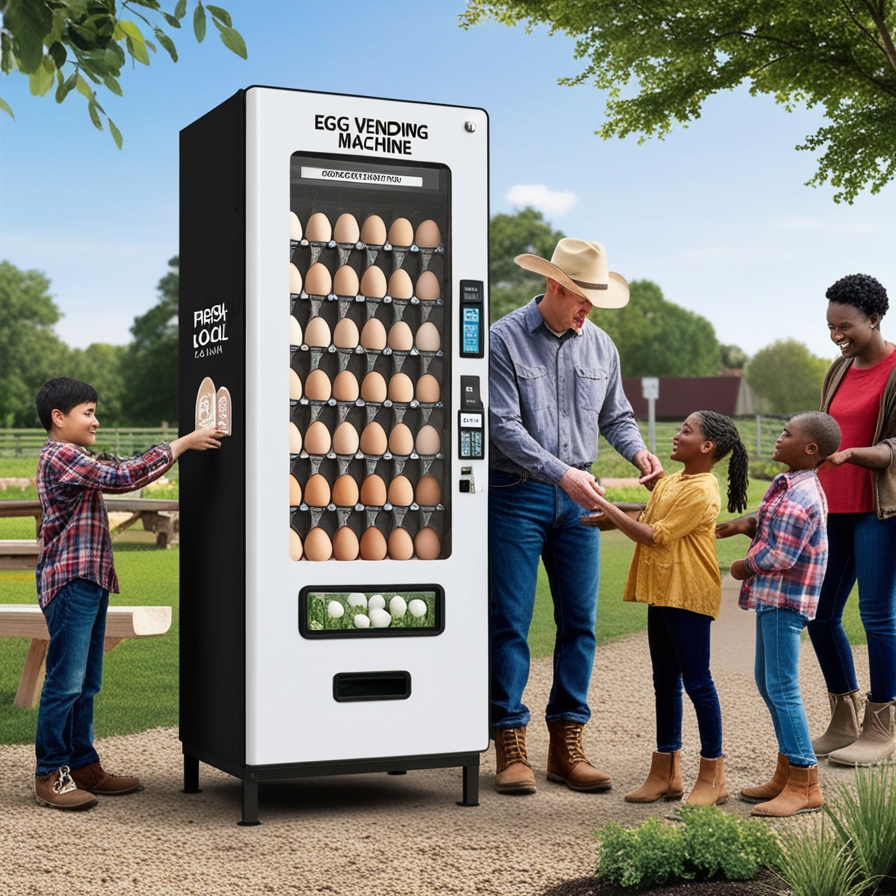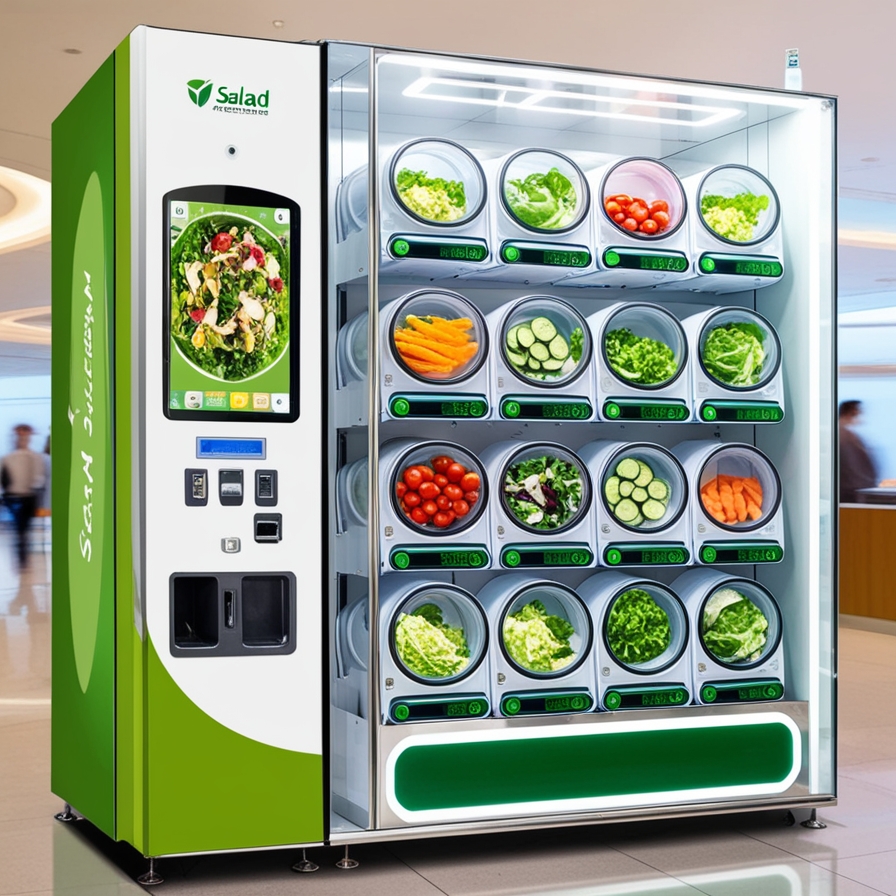Revolutionizing Egg Sales: The Rise of Egg Vending Machines
Introduction
In the past, vending machines have largely been synonymous with instant gratification, dispensing quick snacks and cold beverages to satisfy immediate cravings. However, this traditional market is undergoing a transformative shift, paving the way for an innovative inclusion: egg vending machines.
These novel vending machines aren’t just a quirky new way to buy eggs; they represent a broader movement towards healthier, local food choices. By offering fresh eggs, these machines connect consumers directly with local farms, providing access to nutritious, farm-to-table options right in their neighborhood. This trend not only supports local agriculture but also caters to the growing consumer demand for healthier and more sustainable eating options.
As we delve deeper into the rise of egg vending machines, it’s clear that they are more than just a convenience—they are a part of a larger trend that seeks to revolutionize the way we think about and access everyday staples.
Key Takeaways: Egg Vending Machines
-
Innovative Distribution: Egg vending machines are transforming the way eggs are sold, combining modern technology with traditional farming to provide consumers with fresh, local eggs directly from the source.
-
Support for Local Farmers: These machines help local farmers by opening direct sales channels, reducing dependency on intermediaries, and potentially increasing profit margins.
-
Enhanced Freshness and Safety: Equipped with advanced temperature control and cushioned dispensing mechanisms, egg vending machines ensure eggs are kept fresh and delivered safely.
-
Convenience and Accessibility: Offering 24/7 availability, these machines cater to consumers’ schedules, making it possible to purchase fresh eggs anytime and anywhere.
-
Variety of Payment Options: With the capability to accept multiple forms of payment, including cash, cards, and digital wallets, these machines meet the needs of all consumers.
-
Consumer Trust: Egg vending machines often provide transparency about the eggs’ origins and freshness, building trust and preference among health-conscious and environmentally aware consumers.
-
Potential for Expansion: Given the global shift towards sustainability and local food sourcing, egg vending machines have significant potential to expand into new markets and regions.
What are Egg Vending Machines?
Egg vending machines are an innovative twist on traditional vending technology, designed specifically to dispense fresh eggs. Unlike typical machines that offer pre-packaged snacks or drinks, egg vending machines provide access to fresh, often locally sourced eggs, supporting a shift towards more sustainable and healthy consumer habits.
Operation and Payment Methods
These machines operate similarly to their traditional counterparts but are adapted to handle the delicate nature of eggs. They typically feature secure, cushioned slots to prevent damage during vending. Payment methods are versatile, accommodating a range of modern preferences.
Consumers can pay with cash, credit or debit cards, and increasingly, via mobile wallets. This flexibility in payment enhances accessibility and convenience, appealing to a tech-savvy, health-conscious audience.
Technological Innovations
What truly sets egg vending machines apart are their technological advancements. Many are equipped with temperature control systems to ensure the eggs remain fresh, regardless of external conditions.
Some also incorporate advanced software for inventory tracking and sales analytics, which helps suppliers manage stock efficiently and minimize waste. Additionally, touchscreens and user-friendly interfaces enhance the customer experience, making the purchasing process smooth and straightforward.
These features reflect a significant leap from traditional vending machines, merging convenience with modern demands for quality and sustainability.
The Technology Behind Egg Vending Machines
Egg vending machines incorporate specialized technology to ensure that this delicate product reaches the consumer in perfect condition. The mechanisms behind these innovative devices are designed with precision, focusing on the specific needs of storing and dispensing eggs safely and efficiently.
Storage and Dispensing Mechanisms
The heart of an egg vending machine lies in its storage and dispensing mechanisms. Unlike standard vending machines that drop products, egg vending machines utilize gentle conveyor belts or sliding trays to deliver eggs to the customer without causing any damage.
These machines are often equipped with climate control systems that maintain an optimal temperature and humidity level to keep the eggs fresh for extended periods. Additionally, the internal design includes padded compartments or individual nesting spaces that cradle each egg, reducing the risk of breakage during storage and vending.
Custom Features
Egg vending machines also offer various customizable features that can enhance both functionality and aesthetic appeal. Suppliers can choose to incorporate vibrant brand graphics on the exterior of the machines, making them stand out and effectively communicate the brand’s identity. Digital screens can display advertisements, nutritional information about the eggs, or even promotional videos that engage customers while they wait for their purchase.
Furthermore, these machines can be fitted with smart technology, such as QR code scanners that allow customers to access detailed information about the farm of origin or learn more about specific egg batches. This not only reinforces transparency and trust between consumers and suppliers but also leverages technology to enrich the consumer experience, marrying convenience with comprehensive product knowledge.
Advantages of Egg Vending Machines
Egg vending machines offer a multitude of benefits that extend far beyond the mere convenience of purchasing eggs. These innovative machines support local economies, maintain product freshness, provide valuable data insights, accommodate various payment methods, and offer round-the-clock service, making them a superb choice for both consumers and suppliers.
Supporting Local Farming
By connecting local farmers directly with consumers, egg vending machines create a new sales venue that can help small-scale farmers expand their market reach without the intermediary costs typically associated with retail distribution. This direct-to-consumer model not only increases the farmers’ profit margins but also raises awareness about local agriculture, encouraging communities to support and sustain the local economy.
Maintaining Freshness
One of the standout features of egg vending machines is their advanced temperature control technology. These systems ensure that eggs are stored at ideal conditions, mimicking the natural coolness of a hen’s nest. This technology is crucial for preserving the freshness and nutritional quality of the eggs, significantly extending their shelf life and reducing waste.
Data Insights
Egg vending machines are equipped with sensors and connectivity that allow them to collect and analyze sales data in real time. This capability provides farmers and suppliers with valuable insights into purchasing trends, peak buying times, and customer preferences. Such data is instrumental in optimizing inventory levels, adjusting pricing strategies, and even tailoring marketing efforts to increase sales and customer satisfaction.
Diverse Payment Options
The versatility of payment options is another significant advantage. Modern egg vending machines support multiple payment methods, including cash, credit and debit cards, and mobile payments. This inclusivity ensures that anyone can access the machines, thereby enhancing customer convenience and increasing the potential customer base.
Round-the-Clock Convenience
Perhaps one of the most appealing features of egg vending machines is their 24/7 availability. Unlike traditional stores with set hours, these machines allow customers to purchase fresh eggs at any time of day or night. This around-the-clock accessibility is especially beneficial for busy individuals who may not have the time to shop during regular business hours, providing them with a reliable source of fresh eggs whenever needed.
Where to Buy Egg Vending Machines
For businesses and farmers looking to tap into the convenience and advantages of egg vending machines, several leading manufacturers offer a range of models tailored to meet specific needs.
Here’s a look at some of the top choices available in the market:
1. TCN’s Healthy Food Vending Machine
- TCN, renowned for its diverse range of vending solutions, offers a Healthy Food Vending Machine that is perfect for eggs. This model is equipped with advanced temperature control to ensure freshness and can be customized with various payment systems to cater to a broad audience. TCN machines are known for their reliability and high-tech features, including smart inventory tracking and energy-efficient designs.
2. Weimi Vending’s Egg Cooling Locker Vending Machine
- Weimi Vending provides a specialized Egg Cooling Locker Vending Machine that features individual lockers for eggs. This design minimizes movement and potential damage during dispensing. The cooling technology guarantees the eggs are kept fresh, and the machine comes with user-friendly interfaces and customizable payment options, making it ideal for high-traffic locations.
3. Micron Vending’s Egg Vending Machine
- Micron Vending focuses on delivering user-centric vending solutions and their Egg Vending Machine is no exception. It features innovative dispensing technology that safely handles eggs, robust temperature control systems, and dynamic payment solutions. These machines also come with telemetry systems, allowing remote monitoring and management of sales data and machine performance.
4. Eggspress Vending Machine
- The Eggspress Vending Machine caters specifically to farmers who wish to sell directly to consumers. These machines are typically simpler in design but highly effective, focusing on preserving the integrity and freshness of farm eggs. They can be placed in various consumer-friendly locations, providing farmers with direct access to the market without intermediaries.
Choosing the right egg vending machine depends on several factors, including the intended location, the scale of operations, and specific business goals. Each of these manufacturers provides unique features that can help maximize sales while ensuring customer satisfaction with fresh, readily available eggs.
Case Study: Successful Egg Vending Machine Installations
1. Farm Fresh Eggs Direct – Rural Ohio
- In rural Ohio, a family-run farm known as Farm Fresh Eggs Direct implemented an Eggspress Vending Machine to expand their market. Previously relying on local farmers’ markets and small retail stores, the addition of the vending machine allowed them to reach customers directly, 24/7. The machine was installed at a local community center, leading to a 30% increase in egg sales within the first six months. Customers appreciated the convenience and freshness, and the farm benefited from the reduced costs of not needing a physical storefront.
2. City Eggs – Downtown San Francisco
- City Eggs, a startup in downtown San Francisco, utilized Micron Vending’s Egg Vending Machine to cater to the urban market, where fresh, local produce can be hard to come by. The machine, placed in a high-traffic tech park, uses a sophisticated system to ensure eggs are kept at optimal freshness and are easily accessible to busy professionals. The company reported a 50% increase in sales and significant customer engagement through their smart app that offers promotions and egg recipes linked to the vending machine purchases.
3. The Egg Locker – Melbourne, Australia
- The Egg Locker, operated by Weimi Vending, was set up in Melbourne as part of a pilot project to bring more farm-to-table options to urban areas. Located in a popular mall, the Egg Cooling Locker Vending Machine serves dual functions: it vends eggs and acts as an educational tool about local farming practices. The installation has not only boosted sales but also increased consumer awareness about the benefits of supporting local farms. Feedback from customers has been overwhelmingly positive, with many citing the novelty and the quality of eggs as key factors in their repeated use.
4. Green Valley Poultry – Yorkshire, UK
- Green Valley Poultry, a mid-sized poultry farm in Yorkshire, chose TCN’s Healthy Food Vending Machine to distribute their eggs directly to consumers in nearby towns without traditional retail channels. The smart features of the machine, including remote monitoring and cashless payments, made it an instant hit. Green Valley Poultry reported a steady increase in sales and was able to gather valuable data on buying trends, which helped them optimize their stocking and marketing strategies.
These case studies exemplify how egg vending machines can be a game-changer for egg farmers and retailers by enhancing their distribution network, increasing sales, and meeting the modern consumer’s need for convenience and quality.
Global Popularity and Market Trends of Egg Vending Machines
Popularity in Key Regions
Japan
In Japan, vending machines are an integral part of daily life, offering everything from hot meals to groceries. The introduction of egg vending machines has been warmly received due to the Japanese emphasis on convenience and innovation.
These machines are frequently found in both urban and rural settings, providing access to fresh eggs for busy city dwellers and those in remote areas alike. The technology-driven culture in Japan supports continuous improvements in vending machine functionalities, making them increasingly popular.
Ireland
Ireland has seen a rise in egg vending machines, particularly in rural and suburban areas where community-supported agriculture plays a significant role. These machines have been instrumental in supporting local farms, allowing farmers to sell their products directly to the consumer without the need for middlemen.
The trend aligns well with the Irish consumers’ growing preference for locally sourced and sustainable food options, boosting the popularity of such vending machines across the country.
United States
In the United States, the concept of egg vending machines is relatively new but growing rapidly, especially in regions with a strong focus on organic and local food movements.
They are becoming a common sight at farm stands, farmers’ markets, and even some urban areas, offering a novel solution to the demand for fresh, locally sourced eggs.
The convenience of purchasing eggs via a vending machine is appealing to consumers who seek to support local agriculture while enjoying the ease of shopping.
Predictions for Growth in Other Regions
The global market for egg vending machines is expected to expand as more regions adopt direct-to-consumer sales models and as consumer preferences shift towards local and sustainable food sources. The following trends and regions show potential for growth:
- Europe: Northern European countries like Germany and the Netherlands, which already have a strong vending machine culture and a focus on sustainability, are likely candidates for the expansion of egg vending machines.
- Asia-Pacific: Countries like South Korea and China, where technological integration into daily life is extensive, may see growth in this market. The rise in urban farming initiatives and the increasing awareness of food safety and quality in these regions could drive the adoption of egg vending machines.
- Australia and New Zealand: With a focus on supporting local businesses and sustainable practices, Australia and New Zealand could also see an increase in the use of egg vending machines. These countries have large rural areas where such machines could provide a vital link between local farmers and urban consumers.
As technology advances and consumer habits evolve, the popularity of egg vending machines is likely to increase, offering promising opportunities for farmers and entrepreneurs around the globe. This growth will be supported by advancements in machine technology, making them even more convenient, reliable, and user-friendly, further driving their adoption in both existing and new markets.
Conclusion
Egg vending machines are revolutionizing how we buy fresh food, blending innovative technology with the growing demand for local and sustainable products.
Already popular in Japan, Ireland, and the United States, these machines support local farmers, enhance consumer convenience, and ensure product freshness. With their potential for global expansion, egg vending machines promise to play a significant role in shaping a more sustainable and efficient future in food retail.
FAQs for “Revolutionizing Egg Sales: The Rise of Egg Vending Machines”
1. What are egg vending machines?
- Egg vending machines are automated devices that dispense fresh eggs. Unlike traditional vending machines, these are specifically designed to handle and sell eggs safely and efficiently, often sourced directly from local farms.
2. How do egg vending machines keep the eggs fresh?
- These machines are equipped with temperature control systems that maintain optimal conditions inside the machine, keeping the eggs fresh until they are purchased. Some also feature padded compartments to protect the eggs from damage.
3. Where can I find an egg vending machine?
- Egg vending machines are typically located at farmers’ markets, community centers, near local farms, and in some urban areas. Their locations are often listed on the provider’s website or through dedicated apps.
4. Can I buy eggs from these machines at any time?
- Yes, one of the major advantages of egg vending machines is their 24/7 availability, allowing you to purchase eggs anytime that suits your schedule.
5. What payment methods are accepted by egg vending machines?
- Most egg vending machines accept multiple forms of payment, including cash, debit and credit cards, and mobile payments like Apple Pay or Google Wallet.
6. Are eggs from vending machines more expensive than those in stores?
- The prices can vary; however, they are generally competitive with retail prices. The added benefits include supporting local farmers and accessing fresher products directly.
7. How do I know the eggs are fresh when buying from a vending machine?
- Suppliers often provide details about the source and packing date, which can be accessed via the machine’s digital interface or labels. Some machines also allow scanning a QR code to view detailed information about the eggs’ freshness and origin.
8. What if the machine dispenses a damaged egg?
- Most egg vending machines are equipped with sensors to ensure only undamaged eggs are dispensed. However, if you receive a damaged egg, vendors typically provide a contact number or digital interface for customer service to address any issues immediately.
9. Can these machines dispense other products besides eggs?
- While primarily designed for eggs, some machines might offer other local farm products like dairy or honey, depending on the vendor’s setup.
10. How do these machines benefit local farmers?
- By reducing the need for intermediaries, these machines allow farmers to sell directly to consumers, often resulting in better margins and greater control over pricing and distribution.
11. What is the history of egg production?
- Egg production has been a cornerstone of human agriculture for thousands of years, originating from the domestication of wild fowl in Asia and Europe. Over time, selective breeding improved egg yields and the resilience of chicken breeds, leading to the modern egg industry we see today, which efficiently produces a vast quantity of eggs for global consumption.
12. How did eggs become popular?
- Eggs became popular due to their nutritional value, ease of cooking, and versatility in various cuisines. As agricultural techniques evolved, the ability to produce eggs en masse made them a staple in diets worldwide, cementing their status as a crucial food item.
13. What is the description of an egg?
- An egg typically refers to a chicken egg and consists of a shell, egg white (albumen), and yolk. It is an oval-shaped biological structure laid by females of various species, including birds, reptiles, amphibians, and fish, primarily serving as a means to nurture and protect the developing embryo.
14. What are 5 interesting facts about eggs?
- Color Varieties: The color of an eggshell can be white, brown, or even blue and green, depending on the breed of the hen.
- Nutritional Powerhouse: Eggs are known for being rich in protein, vitamins, and minerals, particularly vitamin D and choline.
- Cholesterol Levels: Once thought to be harmful due to high cholesterol, eggs are now considered part of a healthy diet when consumed in moderation.
- Shell Strength: Eggshells have a natural strength due to their arched shape, often requiring more than 3 pounds of pressure to break from the side.
- Preservation Techniques: Historically, eggs have been preserved using various methods, including pickling, burying in lime, or coating in mineral oil.
15. What is the egg history?
- The history of eggs as a food source dates back to prehistoric times when birds were first domesticated for their eggs around 7000 to 8000 years ago in India and China. Since then, eggs have played an integral role in culinary traditions around the world.
16. How to start an egg business?
- Starting an egg business involves several key steps: researching local regulations, securing a suitable location, choosing the right breed of hens, setting up a conducive environment for egg production, establishing a feed schedule, and marketing your eggs to local markets, stores, or directly to consumers.
17. How to increase egg production?
- To increase egg production, ensure your hens are healthy and stress-free, provide them with a high-quality diet rich in protein and calcium, maintain a consistent light exposure of about 16 hours a day, and keep their living conditions clean and temperate. Regular health check-ups and optimizing the coop’s design to suit the hens’ behavioral needs can also boost productivity.



